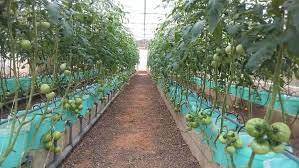Innovative Hydroponic Solution: Addressing Nigeria’s Tomato Crisis with Aquaponics

Tomatoes play a crucial role in the Nigerian diet, with an annual demand soaring to 2.45 million tons. Despite being the largest tomato-producing country in Africa, Nigeria faces a shortfall in meeting its domestic demand, resulting in the importation of over a million tons of tomatoes. The year 2016 witnessed a tomato crisis in Nigeria, triggered by the infestation of the Tuta absoluta moth, causing prices to skyrocket fourfold. Even before the pest outbreak, Nigeria experienced an annual loss of up to 900,000 tons of tomatoes, compounded by extensive transportation losses due to the vast land area. The absence of an effective storage system, coupled with escalating desertification from climate change, further constrained planting space for farmers(quotes from resopp-sn.org).
In response to these challenges, Nigeria’s B.I.C. Farm Concepts agricultural company introduced the “aquaponics” hydroponic method, offering a sustainable solution for farmers to maximize crop production with minimal land and water resources(sources from resopp-sn.org).
While the complete aquaponics system comes with a price tag of approximately 40,000 RMB, it remains beyond the reach of many ordinary Nigerian farmers. However, with the support of the hydroponic system, wastewater generated from fish farming undergoes a filtration process. This system effectively converts fish waste and impurities into valuable nutrients for plants, which are then directed to farmland. The purified water is subsequently returned to the fish pond. The hydroponic system not only addresses waste-related issues but also proves to be a viable option for small-scale cultivation. In comparison to traditional soil cultivation, where resources invested in tomatoes yield only 20 kilograms of flesh, hydroponic cultivation can produce an impressive 50 kilograms or more. The innovative aquaponic solution emerges as a promising strategy to tackle Nigeria’s agricultural challenges, presenting a sustainable pathway to harness the country’s agricultural potential.




